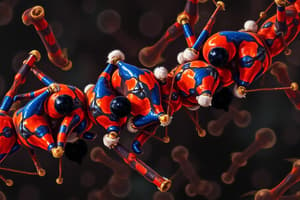Podcast
Questions and Answers
What is the primary function of Major Histocompatibility Complex (MHC) molecules?
What is the primary function of Major Histocompatibility Complex (MHC) molecules?
- To present antigen fragments on cell surfaces (correct)
- To eliminate pathogens directly
- To stimulate B cell activity without T cells
- To produce antibodies for immune response
Which class of MHC molecules is responsible for presenting antigens to CD8+ T cells?
Which class of MHC molecules is responsible for presenting antigens to CD8+ T cells?
- MHC class I (correct)
- MHC class IV
- MHC class III
- MHC class II
What occurs after an antigen is degraded within a cell?
What occurs after an antigen is degraded within a cell?
- The antigen is excreted from the cell without processing
- The antigen is destroyed immediately
- The antigen activates B cells and produces antibodies
- The antigen associates with an MHC molecule and is displayed at the cell surface (correct)
Which cells are considered professional antigen presenting cells (APCs)?
Which cells are considered professional antigen presenting cells (APCs)?
What is one unique pathway mentioned for antigen processing?
What is one unique pathway mentioned for antigen processing?
Which of the following are true about MHC class I molecules?
Which of the following are true about MHC class I molecules?
What is the primary function of MHC molecules?
What is the primary function of MHC molecules?
Which cells primarily express MHC class II molecules?
Which cells primarily express MHC class II molecules?
What distinguishes HLA class I from HLA class II in humans?
What distinguishes HLA class I from HLA class II in humans?
Which statement about HLA is not correct?
Which statement about HLA is not correct?
Study Notes
Antigen Processing and Presentation
- Antigen processing involves capturing and degrading antigens for presentation to T cells via Major Histocompatibility Complex (MHC) molecules.
- T cells require peptide-MHC complexes for recognition, while B cells can bind free antigens directly.
- MHC molecules, encoded by multiple loci, present processed antigen fragments to T cells, pivotal for initiating an immune response.
- MHC class I (HLA class I) is present on all nucleated cells, presenting endogenous peptides to CD8+ T cells.
- MHC class II (HLA class II) is mainly found on professional Antigen Presenting Cells (APCs) like dendritic cells, macrophages, and B cells, presenting exogenous peptides to CD4+ T cells.
Structure and Function of MHC
- MHC class I consists of four domains (α1, α2, α3, and β2-microglobulin) and interacts with CD8+ T cells.
- MHC class II consists of four domains (α1, α2, β1, and β2) and is recognized by CD4+ T cells.
- Human MHC is referred to as Human Leukocyte Antigen (HLA) with two classes: HLA class I and HLA class II, each being polygenic and polymorphic.
Antigen Sources and Presentation Mechanisms
- Endogenous antigens (e.g., viruses, tumors) are modified and presented via MHC class I; they undergo degradation in the cytosol by proteasomes.
- Exogenous antigens (e.g., bacteria) are taken up through endocytosis or phagocytosis, processed in lysosomes, and presented via MHC class II.
- For MHC class I loading, peptides are transported to the endoplasmic reticulum (ER) and bind to MHC class I molecules before transport to the cell surface.
- MHC class II molecules are synthesized in the ER with an invariant chain blocking the peptide groove, replaced by antigen peptides after the chain is cleaved.
MHC Restriction and Immune Response
- T cell recognition is dependent on peptide-MHC complexes; T cell receptors (TCRs) recognize these complexes rather than solitary peptides.
- MHC restriction ensures T cells only respond to self-MHC-displayed peptides, crucial for distinguishing self from non-self.
Clinical Relevance
- MHC compatibility is crucial in organ transplantation; mismatches can lead to rejection.
- Certain MHC genotypes increase the risk of autoimmune diseases such as Type 1 diabetes and rheumatoid arthritis.
- MHC diversity impacts susceptibility to infections and can affect disease outcomes in infections like HIV and malaria.
- Understanding MHC's role in presenting tumor antigens can improve effectiveness in cancer immunotherapy and personalized medicine approaches.
Studying That Suits You
Use AI to generate personalized quizzes and flashcards to suit your learning preferences.
Related Documents
Description
This quiz focuses on the processes of antigen processing and presentation through Major Histocompatibility Complex (MHC) molecules. It covers the differences between MHC class I and class II, their structures, and their roles in T cell recognition. Test your knowledge on how these mechanisms are vital for immune responses!




